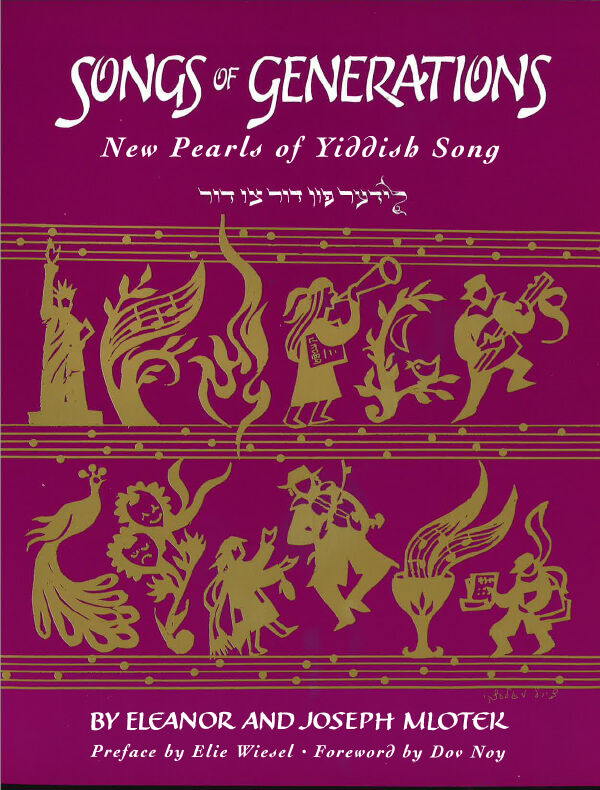Words and music by Fishl Kanapoff, printed in 1924.The song was adapted in the musical The Golden Land where it was sung by actor Bruce Adler.

I will sing a song for you now,
Hu-tsa-tsa, hu-tsa-tsa,
I think this song is very good,
Hu-tsa-tsa, hu-tsa-tsa,
If the song pleases you,
Hu-tsa-tsa, hu-tsa-tsa,
then I will be content, too,
Hu-tsa-tsa, hu-tsa-tsa.
A greenhorn comes into the country,
soon becomes a “single man” –
as soon as he finds a bit of work
he forgets his wife and home.
I went into a restaurant,
I ate very well.
The food tasted good to me
that night it woke me up.
My neighbor says she loves me,
so I go into her room
she receives me nicely
and in the middle, her husband arrives.
“Prohibition” is now fully in force,
drinking has been abolished.
So I save a lot of money,
I make my own liquor and wine.
I went to a wedding,
amused myself very well,
everyone did a mitsvah-dance
and I danced with the bride.
“Smoking” is very expensive here,
I’m not burning up my money in fire.
I sit myself high up on the “roof,”
and breath in the chimney smoke for free.
Now I have finished my song,
and if it gave you an appetite,
if the song succeeded for me,
you can all sing along with me.
lkh zing far aykh yetst a lid,
Hu-tsa-tsa, hu-tsa-tsa,
lkh gleyb dos lidl iz zeyer git*,
Hu-tsa-tsa, hu-tsa-tsa.
Oyb dos lid vet aykh gefeln,
Hu-tsa-tsa, hu-tsa-tsa,
Vel ikh aykh tsufridn shteln.
Hu-tsa-tsa, hu-tsa-tsa.
A griner kumt in land arayn,
Vert er bald a “singlman”
Koym krigt er nor a shtikl “dzhab,”**
Fargest er in der heym dos vayb.
In a restoran bin ikh arayn,
lkh hob gegesn zeyer fayn.
Dos esn hot mir gut geshmekt,
Bay nakht hot dos mikh oyfgevekt.
Mayn shkheyne zogt zi hot mir lib,
lkh kum arayn tsu ir in shtib***,
Zi hot mikh fayn oyfgenumen,
lz der man in mitn ongekumen.
“Prohibishon” iz yetst shtark in kraft,
Dos trinken hot men opgeshaft,
Shpor ikh mir fil gelt ayn,
lkh makh mir bronfn, ikh makh mir vayn.
Oyf a khasene bin ikh geven,
Amuzirt zikh zeyer sheyn,
A mitsve-tentsl tantsn ale,
Un ikh tants mit der kale.
Dos “smukn” kost do zeyer tayer,
Farbren ikh nit di gelt in fayer,
lkh zits mir oyf dem “rut” gants hoykh
Un tsi fun dem koymen umzist dem roykh.
Ge’endikt hob ikh shoyn mayn lid,
Un oyb es makht aykh apetit,
Oyb dos lidl iz mir gelingen,
Kent ir ale mit mir mitzingen.
• gut
** job
*** shtub
איך זינג פֿאַר אײַך יעצט אַ ליד,
הו צאַ צאַ, הו צאַ צאַ.
איך גלײב דאָס לידל איז זײער גוט,
הו צאַ צאַ, הו צאַ צאַ.
אױב דאָס ליד װעט אײַך געפֿעלן,
הו צאַ צאַ, הו צאַ צאַ.
װעל איך אײַך צופֿרידן שטעלן,
הו צאַ־צאַ, הו צאַ צאַ.
אַ גרינער קומט אין לאַנד אַרײַן,
װערט ער באַלד אַ „סינגלמאַן;“
קױם קריגט ער נאָר אַ שטיקל „דושאַב,“
פֿאַרגעסט ער אין דער הײם דאָס װײַב.
אין אַ רעסטאָראַן בין איך אַרײַן,
איך האָב געגעסן זײער פֿײַן;
דאָס עסן האָט מיר גוט געשמעקט,
בײַ נאַכט האָט דאָס מיך אױפֿגעװעקט.
מײַן שכנה זאָגט זי האָט מיר ליב,
איך קום אַרײַן צו איר אין שטוב;
זי האָט מיך פֿײַן אױפֿגענומען,
איז דער מאַן אין מיטן אָנגעקומען.
„פּראָהיבישאָן“ איז יעצט שטאַרק אין קראַפֿט,
דאָס טרינקען האָט מען אָפּגעשאַפֿט;
שפּאָר איך מיר פֿיל געלט אײַן,
איך מאַך מיר בראָנפֿן, איך מאַך מיר װײַן.
אױף אַ חתונה בין איך געװען,
אַמוזירט זיך זײער שײן;
אַ מיצװה־טענצל טאַנצן אַלע,
און איך טאַנץ מיט דער כּלה.
דאָס „סמוקן“ קאָסט דאָ זײער טײַער,
פֿאַרברען איך ניט די געלט אין פֿײַער;
איך זיץ מיר אױף דעם „רוף“ גאַנץ הױך,
און צי פֿון דעם קױמען אומזיסט דעם רױך.
געענדיקט האָב איך שױן מײַן ליד,
און אױב עס מאַכט אײַך אַפּעטיט,
אױב דאָס לידל איז מיר געלונגען,
קענט איר אַלע מיט מיר מיטזינגען.
Song Title: Hu-Tsa-Tsa

The Songs of Generations: New Pearls of Yiddish Song anthology comprises songs that were either never printed before or appeared in rare and inaccessible publications — sometimes in different versions and without proper sources. Most of the songs in this book were submitted by readers of Chana and Yosl’s column “Perl fun der yidisher poezye” (Pearls of Yiddish Poetry) in the Yiddish newspaper Der Forverts (The Forward), initiated in October, 1970. Over 25 years, thousands of songs were collected in correspondence and on cassettes from readers throughout the world, and they represent a veritable national Yiddish song archive. Chana Mlotek, in her introduction, writes, “In the course of years the inquiries, contributions and enthusiasm of these readers have kept our own interest unflagging and have reinforced our dedication to this effort. And in recent years our participants have also been augmented by new readers from the former Soviet Russia, who receive our newspaper there or from newly-arrived immigrants in this country and Israel.”